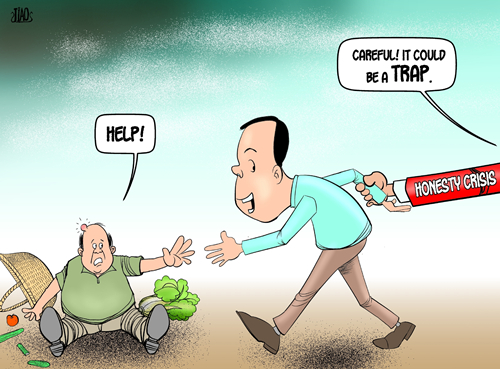Give the country (and its elderly) a hand
- By He Shifei
 0 Comment(s)
0 Comment(s) Print
Print E-mail
China.org.cn, September 11, 2011
E-mail
China.org.cn, September 11, 2011
 |
|
[By Jiao Haiyang/China.org.cn] |
Just imagine: On a sunny Sunday morning, your old papa goes out for a walk. He slips and falls, and he can't manage to get up on his own. But no one who passes by stops to lend a helping hand. Isn't it a miserable picture? Unfortunately, that has become the dire reality in today's China.
According to recent poll on China's Twitter-like microblogging platform Sina Weibo, more than 40 percent of Chinese would not stop to help an elderly person to his or her feet. "It's really hard to be kindhearted these days," one user commented. "I would rather wait for the police." Another user wrote: "I used to tell my kid to help those in trouble, but now, I tell him to protect himself first."
The public cynicism and anger has been triggered by news last week of a rescue attempt gone wrong. On Aug. 27, an old woman blamed the bus driver who helped her up from a flipped cart for knocking her down. After witnesses and a camera installed on the bus's windshield cleared Yin Hongbin, the driver, from wrongdoing, the public began to question: "Should we ever help?"
Yin is not the only good Samaritan facing legal charges. Xu Yunhe, a 29-year-old who allegedly helped a senior woman to her feet, is still appealing against a court ruling that ordered him to pay over 100,000 yuan (US$15,632) in compensation after the woman accused him of hitting her with his car.
On Sept. 6, China's Ministry of Health issued a guideline on when to help senior citizens that take a tumble. "Whether to lift up a tumbled senior should be contingent upon the situation," the note advised. The statement has struck the public nerve. Many people jeered the ministry for offering excuses to indifferent onlookers, while others complained that the guide would not help those that clear their name and fight off legal charges.
While the Ministry of Health is busy explaining that the guide only offers technical help and bears no moral implications, the public reaction makes it obvious that there is no easy way to get Chinese society back on its feet.
Back to that sunny Sunday morning. If a keen teenager helped your old father get up, would your father sue him? Of course not. He would say thank you, and maybe even invite him to coffee or lunch.
This seems normal, not only because we appreciate the compassion of others, but also because we do not want to worry about the appalling expenses of taking a family member to the doctor's. Or, in a country with a well-established legal system, people simply know that they will be held accountable for fraud.
A preliminary study by a group of Stanford University students in early 2010 found that fewer Chinese are willing to offer medical aid to passersby in need, compared to those in Western countries. "Many Americans learn first aid skills from local Red Cross, while it seems that few Chinese have considered this. Maybe they have limited access to such resources," one of the researchers said.
The Stanford scholars might be glad to see the Ministry of Health's guideline, but could be disheartened by the cynical responses on the Internet. Indeed, technical support is not enough to uphold trust and kindness in a society. Nor will moral accusations do. People who are still struggling to maintain a basic standard of living are desperate for a social security system.
Not that many burglars will commit a crime if they can live a decent life otherwise. They do it because of unemployment or extreme income disparity. The Ministry of Health might exempt itself from the responsibility of giving moral guidance. But the government is obliged to ensure the security of its citizens.
China has an aging population of more than 150 million people over 65 years old. Amid uncertainties of the current global economic downturn, it could be exceptionally difficult to establish a social security network that covers such enormous population. Indeed, the mounting government debt of the United States and many European countries serve as counter examples to such a policy. Yet, innovative ways of combining personal savings and national insurance plans can be practical.
It is time for the country with a double-digit GDP growth rate to slow down and balance its economic achievement with the wellbeing of its people. And it is time for us to start making efforts to enable our fathers to walk on the street without worrying about falling down among coldhearted onlookers.
He Shifei is a Chinese freelance journalist currently living in the U.S. Her research interests include government, politics and policy studies.
Opinion articles reflect the views of their authors, not necessarily those of China.org.cn
Go to Forum >>0 Comment(s)
 Add your comments...
Add your comments...
- User Name Required
- Your Comment
- Racist, abusive and off-topic comments may be removed by the moderator.





